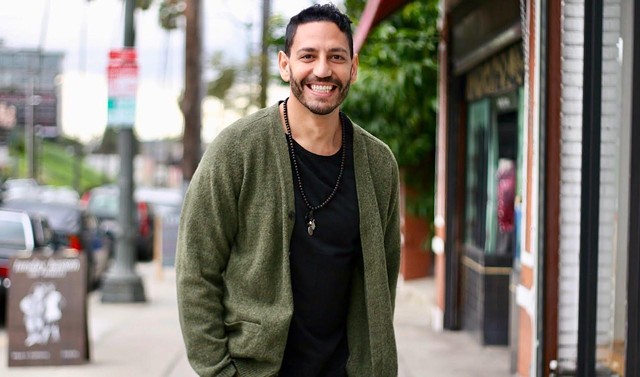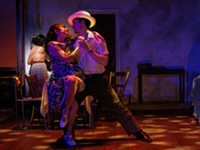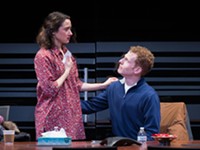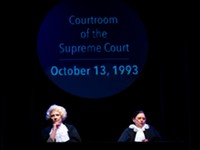[
{
"name": "500x250 Ad",
"insertPoint": "5",
"component": "15667920",
"parentWrapperClass": "",
"requiredCountToDisplay": "1"
}
]
Diplomat. Soldier. Polo player. Treasure hunter. Race-car driver. Jet-setting international playboy. The FBI suspected he was an assassin working for the Dominican dictator Rafael Trujillo.
But you know him as the real-life inspiration for James Bond.
“It’s kind of astonishing that one person can be in so many places at once,” Christopher Rivas says.
Yet why do you not know Porfirio Rubirosa?
“Is there really more of an international man of mystery?” Rivas asks.
Rivas wrote and stars in “The Real James Bond… Was Dominican,” the new production by Geva Theatre Center, opening Friday and running through May 29.
The show’s very existence confronts the coronavirus pandemic head on, along with much longer-running issues for a New York City kid who grew up worshiping the James Bond films of Sean Connery. Too young to drive an Aston-Martin sports car, but imaginative enough to be running around with Nerf guns, pretending he was on secret missions.
In “The Real James Bond… Was Dominican,” Rivas asks of Rubirosa’s legacy: “How did someone who had so much influence in the world, who was involved in so many things, who had the most successful franchise in history based on him, how did he vanish?”
And he asks of himself: “I’m a Dominican man, and so I have to wonder what my life would have been like had I not been pretending to be a white man with a British accent?”
“The Real James Bond… Was Dominican” offers answers.
Rivas has an extensive theater résumé, as well as appearing in television shows such as “Grey’s Anatomy” and is currently on Fox’s “Call Me Kat.” He’s spread the creative wealth by launching storytelling workshops, and working on his autobiography, “Brown Enough.” All of this trying, he says, “to spark conversation.”
Yet in this COVID-19 world, without an audience, the spark has no tinder to set afire.
“Where I come from, theater doesn’t really exist without the audience, the other person,” Rivas says. “I want them in the space with me.”
The space, as we are now quite used to, is virtual. “The Real James Bond… Was Dominican” is a live broadcast via Zoom video conferencing technology. After buying a ticket through Geva’s website, the audience watches the show, broadcast live from Geva’s Wilson Stage. Rivas watches, and listens, to the audience.
“Be present, don’t disappear into your screens, treat it as if you were coming to the theater,” Rivas says. “Dim the lights in your house, have the glass of wine beforehand if you need to, and show up, put your phone away and enjoy that hour with me.
“It’s also good as a performer to not be performing into a void, but to know that the audience is here with me, and I can hear them and see them. And we’re asking people to keep their cameras on, as if they were showing up at the theater.”
Once the audience has settled into its living rooms, beverages in hand, it will be “looking at the way this man, Porfirio Rubirosa, this man who was twice the richest man in the world” — he married well, twice — “knew everybody, was everywhere,” Rivas says. “Hitler’s Germany. Fidel’s Cuba. Best friends with the Rat Pack and Kennedy and Prince Aly Khan. And Marilyn Monroe. You name it. And how he was just sort of taken from history.”
With “The Real James Bond… Was Dominican,” Rivas also examines his own life. “How would my life have been different had the character I loved most as a child looked like me, or looked like my father.”
And we see Rivas looking back at himself, as a young man.
“The way I was living my life as a man of color, especially one who works in Hollywood, you know, it revealed dangerous things I was living in my own life,” he says. “How I needed to watch what I was doing and how it was changing my body and my ways of living that I needed to put a stop on in order to find my voice.”
A decade ago, Rivas was a 21-year-old college student when he first encountered the story of Rubirosa. It was an article in Vanity Fair magazine, and Rivas was overwhelmed. To this day, Rivas doesn’t understand why those words didn’t go viral.
How did we lose sight of Rubirosa?
“I have to imagine it has to do with colonization and our obsession with Eurocentric standards and, you know, a thing that’s still happening to this day,” Rivas says. “Stealing people’s stories for the whiter audiences.”
Ian Fleming was the author behind James Bond. Fleming and Rubirosa, Rivas says, “spent a lot of time together.”
“Rubirosa discovered sunken treasure off the coast of Spain, and everything he did to discover that treasure was expressed word for word in ‘Thunderball,’ the fifth novel in the Bond series.”
Fleming used his friend, Rivas says. “He had a huge part in making this man disappear, in taking his stories and not making them about him.”
So Fleming was one of the primary thieves of Rubirosa’s legacy.
“If he would have been helping, he would have said, ‘Here’s this Dominican man, look how cool he is.’ But he said, ‘Here’s this white British naval officer.’”
Yet it was a game that could accommodate more than one player, and that included Rubirosa.
“As much as whiteness may have taken his story, I also know that Rubirosa was taken by white men in a way to be seen, in a way to be accepted, in a way to try and have upward mobility,” Rivas says. “How much can you try and fit into their game, a game that isn’t designed for you.”
Jeff Spevak is WXXI’s Arts & Life editor and reporter. He can be reached at [email protected].
But you know him as the real-life inspiration for James Bond.
“It’s kind of astonishing that one person can be in so many places at once,” Christopher Rivas says.
Yet why do you not know Porfirio Rubirosa?
“Is there really more of an international man of mystery?” Rivas asks.
Rivas wrote and stars in “The Real James Bond… Was Dominican,” the new production by Geva Theatre Center, opening Friday and running through May 29.
The show’s very existence confronts the coronavirus pandemic head on, along with much longer-running issues for a New York City kid who grew up worshiping the James Bond films of Sean Connery. Too young to drive an Aston-Martin sports car, but imaginative enough to be running around with Nerf guns, pretending he was on secret missions.
In “The Real James Bond… Was Dominican,” Rivas asks of Rubirosa’s legacy: “How did someone who had so much influence in the world, who was involved in so many things, who had the most successful franchise in history based on him, how did he vanish?”
And he asks of himself: “I’m a Dominican man, and so I have to wonder what my life would have been like had I not been pretending to be a white man with a British accent?”
“The Real James Bond… Was Dominican” offers answers.
Rivas has an extensive theater résumé, as well as appearing in television shows such as “Grey’s Anatomy” and is currently on Fox’s “Call Me Kat.” He’s spread the creative wealth by launching storytelling workshops, and working on his autobiography, “Brown Enough.” All of this trying, he says, “to spark conversation.”
Yet in this COVID-19 world, without an audience, the spark has no tinder to set afire.
“Where I come from, theater doesn’t really exist without the audience, the other person,” Rivas says. “I want them in the space with me.”
The space, as we are now quite used to, is virtual. “The Real James Bond… Was Dominican” is a live broadcast via Zoom video conferencing technology. After buying a ticket through Geva’s website, the audience watches the show, broadcast live from Geva’s Wilson Stage. Rivas watches, and listens, to the audience.
“Be present, don’t disappear into your screens, treat it as if you were coming to the theater,” Rivas says. “Dim the lights in your house, have the glass of wine beforehand if you need to, and show up, put your phone away and enjoy that hour with me.
“It’s also good as a performer to not be performing into a void, but to know that the audience is here with me, and I can hear them and see them. And we’re asking people to keep their cameras on, as if they were showing up at the theater.”
Once the audience has settled into its living rooms, beverages in hand, it will be “looking at the way this man, Porfirio Rubirosa, this man who was twice the richest man in the world” — he married well, twice — “knew everybody, was everywhere,” Rivas says. “Hitler’s Germany. Fidel’s Cuba. Best friends with the Rat Pack and Kennedy and Prince Aly Khan. And Marilyn Monroe. You name it. And how he was just sort of taken from history.”
With “The Real James Bond… Was Dominican,” Rivas also examines his own life. “How would my life have been different had the character I loved most as a child looked like me, or looked like my father.”
And we see Rivas looking back at himself, as a young man.
“The way I was living my life as a man of color, especially one who works in Hollywood, you know, it revealed dangerous things I was living in my own life,” he says. “How I needed to watch what I was doing and how it was changing my body and my ways of living that I needed to put a stop on in order to find my voice.”
A decade ago, Rivas was a 21-year-old college student when he first encountered the story of Rubirosa. It was an article in Vanity Fair magazine, and Rivas was overwhelmed. To this day, Rivas doesn’t understand why those words didn’t go viral.
How did we lose sight of Rubirosa?
“I have to imagine it has to do with colonization and our obsession with Eurocentric standards and, you know, a thing that’s still happening to this day,” Rivas says. “Stealing people’s stories for the whiter audiences.”
Ian Fleming was the author behind James Bond. Fleming and Rubirosa, Rivas says, “spent a lot of time together.”
“Rubirosa discovered sunken treasure off the coast of Spain, and everything he did to discover that treasure was expressed word for word in ‘Thunderball,’ the fifth novel in the Bond series.”
Fleming used his friend, Rivas says. “He had a huge part in making this man disappear, in taking his stories and not making them about him.”
So Fleming was one of the primary thieves of Rubirosa’s legacy.
“If he would have been helping, he would have said, ‘Here’s this Dominican man, look how cool he is.’ But he said, ‘Here’s this white British naval officer.’”
Yet it was a game that could accommodate more than one player, and that included Rubirosa.
“As much as whiteness may have taken his story, I also know that Rubirosa was taken by white men in a way to be seen, in a way to be accepted, in a way to try and have upward mobility,” Rivas says. “How much can you try and fit into their game, a game that isn’t designed for you.”
Jeff Spevak is WXXI’s Arts & Life editor and reporter. He can be reached at [email protected].
Speaking of...
Latest in Theater
More by Jeff Spevak
-
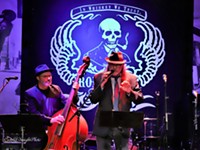
End of an error
Oct 30, 2023 -

Whiskey, surf music — and a bit of Hoochenanny
Oct 16, 2023 -
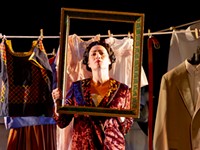
Season of death
Oct 13, 2023 - More »
